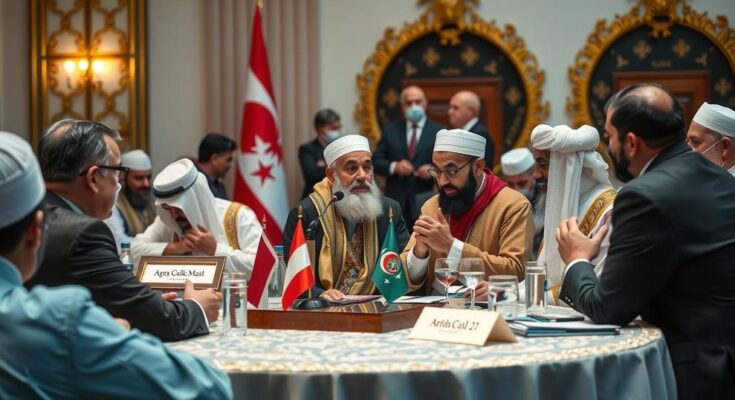Leaders from Turkiye and Iran met in Cairo for a D-8 summit, addressing regional instability, notably in Syria and Gaza. Turkiye’s Erdogan called for Syrian unity and peace, while Iran’s Pezeshkian emphasized the necessity of intervention in ongoing conflicts. The visit marked significant diplomatic engagement, reflecting a gradual thaw in Egypt-Iran relations amid geopolitical tensions.
On Thursday, the leaders of Turkiye and Iran convened in Egypt for a summit involving eight Muslim-majority nations, marking their first meeting since the dethronement of Syrian President Bashar Assad. Historically, Turkiye has aligned with Assad’s opposition, conversely, Iran has provided support for his government. The summit, under the auspices of the D-8 Organization for Economic Cooperation, coincided with significant regional instability, characterized by the ongoing Gaza conflict, a precarious truce in Lebanon, and continued unrest in Syria.
In his address, President Recep Tayyip Erdogan of Turkiye called for collaborative efforts to restore Syria’s territorial integrity and unity, expressing aspirations for a Syria devoid of terrorism and where diverse religious and ethnic communities coexist peacefully. Iranian President Masoud Pezeshkian emphasized the moral imperative to mitigate the crises affecting Gaza, Lebanon, and Syria, stating it is essential to prevent added suffering in these distressed regions.
Pezeshkian’s visit to Egypt is noteworthy, being the first by an Iranian president since Mahmoud Ahmadinejad in 2013. Despite long-standing tensions between Egypt and Iran, diplomatic interactions have been revitalized, particularly as Egypt has taken on a mediating role in the Gaza conflict. Recent high-level engagements included visits from Iranian and Egyptian foreign ministers, indicating a warming of relations. As the summit approached, Pezeshkian expressed the hope for the gathering to yield a decisive communicative stance against the perceived Israeli aggressions in the aforementioned regions.
Previously, President Erdogan had discussed economic collaboration and regional issues with Egyptian President Abdel Fattah El-Sisi during an earlier visit. The D-8 organization, which encompasses member countries such as Egypt, Turkiye, Iran, Nigeria, Pakistan, Bangladesh, Indonesia, and Malaysia, was founded in 1997 to enhance cooperation among developing nations across Asia and Africa.
The D-8 Organization for Economic Cooperation aims to promote collaboration among eight Muslim-majority countries, facilitating dialogue and cooperation in economic development. This summit comes during a period of heightened geopolitical tension in the Middle East, particularly regarding the conflicts in Gaza, Lebanon, and Syria. Notably, the relationship between Turkiye and Iran has been complex, shaped by differing stances on regional conflicts, notably the Syrian civil war. The recent diplomatic overtures between Egypt and Iran signify a shift in regional diplomacy, highlighting Egypt’s mediation efforts and increasing communications among the leaders.
The recent summit in Cairo, attended by the leaders of Turkiye and Iran, underscores significant diplomatic engagement amidst regional turmoil. Both leaders voiced intentions to foster peace and unity in Syria and expressed grave concern regarding ongoing conflicts in Gaza and Lebanon. The D-8 Organization remains a pivotal platform for advancing cooperation among its member nations, particularly as they navigate complex geopolitical landscapes. Enhanced diplomatic relations between Egypt and Iran indicate a potential shift towards increased collaboration in addressing regional issues.
Original Source: www.arabnews.com




